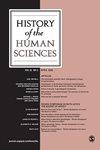1945年至1990年美国的管理权力和精神病培训
IF 0.5
2区 历史学
Q2 HISTORY & PHILOSOPHY OF SCIENCE
引用次数: 0
摘要
在第二次世界大战期间,美国精神病学家在应对美国士兵的情感挑战方面发挥了更大的作用,他们越来越多地认为,基于对无意识过程的解释,他们对人性的了解是影响社会变革的有力工具。当他们转向培训足够数量的精神病医生以满足不断扩大的需求时,精神病学住院医师项目的教育工作者面临着这样的问题:应该委托谁来进行精神病学解释,应该如何利用教育工作者对受训者自身无意识过程的了解,以及在培训中应该在多大程度上遵守严格的精神分析理论。20世纪70年代,精神病学内外的社会和文化动荡开始推翻战后一代精神病学家的宏伟主张,而20世纪80年代的转变导致教育工作者更多地关注看似客观的教育措施。受训者和批评者对美国社会和精神病学培训项目中的权威和结构的严重质疑,可能也是一个因素——如果不是更多的话——在学术精神病学中从强调精神分析的解释力转向更折衷的、最终是生物学的方法。本文章由计算机程序翻译,如有差异,请以英文原文为准。
Managing power and psychiatric training in the United States, 1945–1990
In the wake of their heightened role in addressing the emotional challenges of United States soldiers during World War II, American psychiatrists increasingly argued that their knowledge of human nature, based on interpretation of unconscious processes, was a powerful tool in effecting changes in society. As they turned to training an adequate supply of psychiatrists to meet expanding demand, educators in psychiatry residency programs faced questions about whom to entrust with the power of psychiatric interpretation, how educators’ knowledge about trainees’ own unconscious processes should be harnessed, and how much to adhere to strict psychoanalytic doctrine in training. During the 1970s, social and cultural upheavals outside and inside psychiatry began to dismantle the grand claims of the postwar generation of psychiatrists, while shifts in the 1980s led educators to focus more on seemingly objective educational measures. Trainees’ and critics’ serious questioning of authority and structures in American society, and within psychiatry training programs, was perhaps as much of a factor – if not more – in the shift away from an emphasis on the interpretive power of psychoanalysis in favor of more eclectic and ultimately biological approaches in academic psychiatry.
求助全文
通过发布文献求助,成功后即可免费获取论文全文。
去求助
来源期刊

History of the Human Sciences
综合性期刊-科学史与科学哲学
CiteScore
1.60
自引率
11.10%
发文量
31
审稿时长
>12 weeks
期刊介绍:
History of the Human Sciences aims to expand our understanding of the human world through a broad interdisciplinary approach. The journal will bring you critical articles from sociology, psychology, anthropology and politics, and link their interests with those of philosophy, literary criticism, art history, linguistics, psychoanalysis, aesthetics and law.
 求助内容:
求助内容: 应助结果提醒方式:
应助结果提醒方式:


